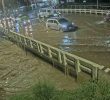Alan Montecalvo, Indug’s spokesperson said Apex’s dumping of soil into the river has aggravated flooding when typhoon Pablo brought rains last December. The floods totally damaged 54 houses, partially damaged 30 houses and also damaged their livelihood including crops and farm animals. It also destroyed the bridge and riverways and killed two residents.
By ACE R. MORANDANTE
Davao Today
MACO, Compostela Valley, Philippines — Typhoon Pablo victims from the Mansaka tribe and the large-scale Apex Mining Corporation settled for the latter to give assistance as a sort of “reparation,” the details to be ironed out in a formal memorandum of agreement to be inked later this month.
The non-formal settlement concluded an eight-hour picket rally outside the firm’s gate Monday where over 400 protesters from the Indug Kautawan (a Mansaka term for People Stand Up )-Masaralines, demanded for the company’s assistance for the victims of Typhoon Pablo living in the villages of Elizalde, Masara and Tagbarus.
Alan Montecalvo, Indug’s spokesperson said Apex’s dumping of soil into the river has aggravated flooding when typhoon Pablo brought rains last December. The floods totally damaged 54 houses, partially damaged 30 houses and also damaged their livelihood including crops and farm animals. It also destroyed the bridge and riverways and killed two residents.
According to its website, the Apex Mining has been extracting gold and silver for 40 years in Maco, when it was taken over in 2005 by the Canada-based Crew Gold Corporation and Mapula Creek Gold Corp. It has a Mineral Production Sharing Agreement since December 2005 extendable to another 25 years, covering an area of 2,237 hectares.
Indug Katawhan has asked the mining company to pay PHP 6.9 Million for the damages of homes and livelihood. It demanded for the company to stop its open-pit mining operations within the 870-hectare contract in Sta. Clara, as it greatly threatens the people in the area. They also wanted the company to stop its plan of building a dam in Tagbaro village.
Montecalvo lamented, “We used to catch a lot of fish in the rivers for our sustenance. But when Apex started its operations it destroyed our rivers. Now, the fishes are gone.”
Montecalvo also said they have not experienced heavy flooding before, not until the Apex mining started excavating from the mountains some 1,500 tons (1.5 Million kilos) of soil.
Five years ago, landslides in Maco killed 30 people and displaced 5,000 residents, a disaster which environmentalist group Panalipdan back then attributed to Apex’s use of heavy equipment and “environmentally hazardous methods” in its large-scale mining operations.
Back then, the group and the residents demanded for damages.
And it seems to be history repeating itself, as residents now put the company to task in compensating for Typhoon Pablo.
In an interview by davaotoday.com, Luciano Bongcac of the Apex’s Community Relation Department, prior to settling with the protesters, denied Indug Kautawan’s claims.
Bongcac said “it’s unfair” that they are blamed for the devastation as they can’t accept sole responsibility given that there are small-scale mining operations also operating in the area. He said it’s also not fair that they are made to pay for the damages.
For Omar Aquino, a resident of Panibasan village and one of the leaders of Indug Kautawan, they are just fighting for the protection of their ancestral domain.
He added that even Republic Act 8731 or the Indigenous People’s Rights Act prohibits excavation, digging and exploration so, “why then is the Apex Mining imposing an open-pit operation?”
“What’s the protection left for the indigenous peoples when already our ancestral domains are destroyed by this foreign capitalist company?” he lamented.
But for Apex’s Bongac, “We don’t dump soil in the rivers,” adding that they have tailing dams for their excavated soil.
“Yes, they have tailing dams for their wastes. But how come those were not full despite their daily operations?,” Montecalvo asked asserting that the soil are really dumped into the rivers.
Meanwhile, Apex’s Bongcac said they have slope stabilization. He explained that mountains with tunnels below are prone to landslide, especially with earthquakes, thus they stabilized it using the method.
In the end, after the eight-hour blockade at the gate, the company was said to have acquiesced to Indug Kautawan’s demands.
Both parties have agreed to meet on March 25 to sign a Memorandum of Agreement with the representatives from the local government of Maco. By then, the details of the demands and mechanism for reparations are said to be discussed.
“This is a partial victory for the typhoon victims in the mineral-rich Masara Lines who militantly asserted their environmental rights,” said Juland Suazo of Panalipdan. (Ace R. Morandante/davaotoday.com)










